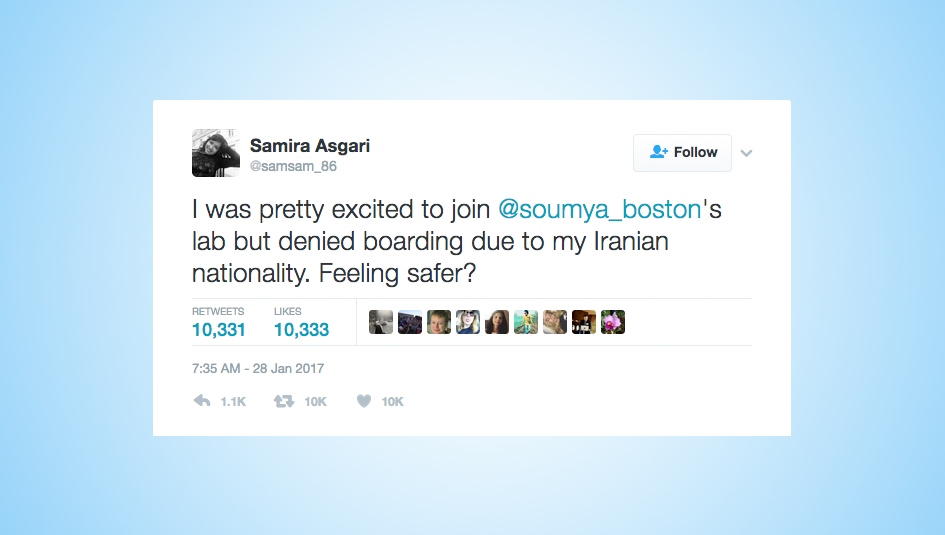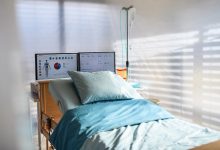Two Foreign Doctors Barred from Work in Diabetes-Focused Medical Institutions

11:10 – 1/30/2017 – This story has been updated to include a tweeted response from Dr. Asgari, and comment from Dr. Soumya Raychaudhuri.
President Donald Trump’s temporary ban on immigration from seven predominantly Muslim countries has already blocked two doctors from coming to work in medical institutions that focus on diabetes research, according to published reports. The order also may have a ripple effect on medical research for some time to come.
Read “How the Trump Immigration Ban Might Affect Diabetes Research.”
The ban, which excludes most, if not all, immigration from, Iran, Iraq, Libya, Somalia, Sudan, Syria, and Yemen, was enacted by executive order on January 27th with little warning. It quickly ensnared travelers en route, including some with valid green cards and job offers to work in the U.S.
One of those turned back was Dr. Samira Asgari, an Iranian scientist who held a J-1 Visa and was traveling to work at The Raychaudhuri Lab in Boston. The lab, which is connected with Harvard Medical School and Brigham & Women’s Hospital, does cure research work on tuberculosis, rheumatoid arthritis, and Type 1 diabetes. Dr. Asgari told Insulin Nation via tweet that she was coming to research the genomic change that occurs when tuberculosis becomes active in the body. She had received two years of funding for research from the Swiss National Science Foundation, according to a Boston Globe report. Dr. Soumya Raychaudhuri, a rheumatologist at Brigham and Women’s Hospital, said in an email interview with Insulin Nation that Dr. Asgari’s work may have crossover potential into diabetes research, as the three diseases the lab researches all are linked by a immune cell dysfunction.
Over the weekend since the executive order was signed, several judges have intervened to order a halt to some, if not all, aspects of the travel ban. However, multiple media outlets are reporting that U.S. Customs and Border Protection agents are not upholding the court rulings, and confusion reigns. Also, the Trump administration has sent conflicting signals, saying that green card holders would be allowed in on a case-by-case basis. The administration has also stated that the executive order is still fully in place, despite the court orders. Meanwhile, the Department of Homeland Security has put out a statement saying, “Upon issuance of the court orders yesterday, U.S. Customs and Border Protection (CBP) immediately began taking steps to comply with the orders.”
On the morning of Monday, January 30th, Dr. Asgari tweeted that she was still not able to board a plane for the U.S.
Despite the Federal Court restraining order @FlySWISS & @lufthansa told me Iranians still can’t fly to Boston. @ACLU_Mass is this legal?
— Samira Asgari (@samsam_86) January 30, 2017
Over the weekend, there was at least one other report of a doctor being barred entry from coming to work in a medical institution that focuses on diabetes research. According to ProPublica, Dr. Suha Abushamma was forced to leave the United States hours after landing in New York City. Dr. Abushamma, who is a first-year resident in Internal Medicine at the Cleveland Clinic, was born in Saudi Arabia, but holds a passport from Sudan, one of the banned countries. The Cleveland Clinic is considered a world leader in Type 2 diabetes and obesity research.
According to the report, Dr. Abushamma was given a choice to voluntarily leave the country or be forcibly deported, which would have banned her from U.S. soil for five years.
“I’m only in this country to be a doctor, to work and to help people — that’s it,” she said on an interview during her flight back, according to the report.
Already, concerns are growing that this temporary ban may have a lasting impact on the pipeline of foreign-born medical researchers and doctors coming to the U.S. to work. In a column for STAT News, columnist Dr. Jennifer A. Okwerekwu said the ban covers the time of the year when medical students and graduates of foreign medical schools learn if they are matched with medical residency programs. Dr. Okwerekwu, a resident with Cambridge Health Alliance, spoke with several other residents or residency candidates who feared the order would jeopardize their chances of having medical careers in the U.S. Those she spoke with feared that their applications for medical residency would be disregarded because of the order.
Dr. Raychaudhuri echoed those same fears, stating that “(s)cience, and in particular genomics, is a global enterprise. The United States has been at the center of science globally, in part, because of its open culture and its willingness to recruit talent from all over the world. This executive order restricts specific countries indiscriminately from providing their talent to the US. Furthermore it has made many non-citizen scientists feel insecure. These changes make it harder for us to recruit the best talent, and puts us at a competitive disadvantage against other leading international institutions.”
Insulin Nation will continue to cover what impact President Trump’s order may have on diabetes research in the coming weeks.
Thanks for reading this Insulin Nation article. Want more Type 1 news? Subscribe here.
Have Type 2 diabetes or know someone who does? Try Type 2 Nation, our sister publication.







